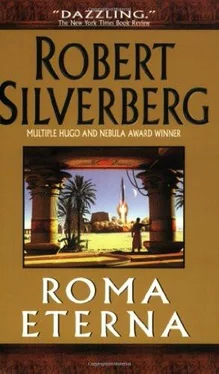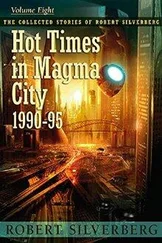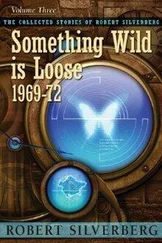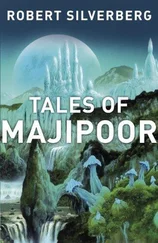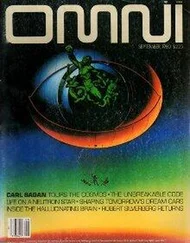Robert Silverberg - With Caesar in the Underworld
Здесь есть возможность читать онлайн «Robert Silverberg - With Caesar in the Underworld» весь текст электронной книги совершенно бесплатно (целиком полную версию без сокращений). В некоторых случаях можно слушать аудио, скачать через торрент в формате fb2 и присутствует краткое содержание. Год выпуска: 2003, ISBN: 2003, Издательство: HarperCollins, Жанр: Альтернативная история, на английском языке. Описание произведения, (предисловие) а так же отзывы посетителей доступны на портале библиотеки ЛибКат.
- Название:With Caesar in the Underworld
- Автор:
- Издательство:HarperCollins
- Жанр:
- Год:2003
- ISBN:978-0-380-97859-5
- Рейтинг книги:5 / 5. Голосов: 1
-
Избранное:Добавить в избранное
- Отзывы:
-
Ваша оценка:
- 100
- 1
- 2
- 3
- 4
- 5
With Caesar in the Underworld: краткое содержание, описание и аннотация
Предлагаем к чтению аннотацию, описание, краткое содержание или предисловие (зависит от того, что написал сам автор книги «With Caesar in the Underworld»). Если вы не нашли необходимую информацию о книге — напишите в комментариях, мы постараемся отыскать её.
With Caesar in the Underworld — читать онлайн бесплатно полную книгу (весь текст) целиком
Ниже представлен текст книги, разбитый по страницам. Система сохранения места последней прочитанной страницы, позволяет с удобством читать онлайн бесплатно книгу «With Caesar in the Underworld», без необходимости каждый раз заново искать на чём Вы остановились. Поставьте закладку, и сможете в любой момент перейти на страницу, на которой закончили чтение.
Интервал:
Закладка:
Saying that Maximilianus would become a great hero, though: that must have been what stung him so, Faustus thought. Doubtless he did not regard himself as having a single iota of the stuff of heroes in him, whatever a flattering soothsayer might choose to say. And must believe also that all Roma perceived him not as a handsome young prince who might yet achieve great things but only as the idle wencher and gambler and dissipated profligate rogue that he was in his own eyes. And so he would interpret the soothsayer’s words as mockery of the most inflammatory kind, rather than as flattery.
“We should quickly find ourselves a wineshop, I think,” Faustus said. “Some wine will cool your overheated blood, my lord.”
Indeed the wine, vile though it was, calmed Maximilianus rapidly, and soon he was laughing and shaking his head over the impudence of the ratty little man. “A hero of the realm! Me! And Emperor, too? Was there ever a soothsayer so far from the truth in his auguries?”
“If they are all like that one,” said bar-Heap, “then I think there’s no need to fear the coming fiery destruction of the universe, either. These men are clowns, or worse. All they provide is amusement for fools.”
“A useful function in the world, I would say,” Menandros observed. “There are so many fools, you know, and are they not entitled to amusement also?”
Faustus said very little. The episode among the sorcerers and soothsayers had left him in a mood of uncharacteristic bleakness. He had always been a good-humored man; the Caesar prized him for the jolly companionship he offered; but his frame of mind had grown steadily more sober since the coming to Roma of this Greek ambassador, and now he felt himself ringed round with an inchoate host of despondent thoughts. It was spending so much time in this underground realm of darkness and flickering shadows, he told himself, that had done this to him. He and the prince had found only pleasure here in days gone by, but their time these two days past in these ancient tunnels, this mysterious kingdom of inexplicable noises and visitations, of invisible beings, of lurking ghosts, had made him weary and uncomfortable. This dank sunless underground world, he thought, was the true Roma, a benighted kingdom of magic and terror, a place of omens and dread.
Would the world be destroyed by flame in eighteen years, as the old man said? Probably not. In any case he doubted that he would live to see it. The universe’s end might not be approaching, but surely his own was: five years, ten, at best fifteen, and he would be gone, well before the promised catastrophe, the—what had the Greek called it?—the great ekpyrosis.
But even if no flaming apocalypse was really in store, the Empire did seem to be crumbling. There were symptoms of disease everywhere. That the man second in line for the throne would react with such fury at the possibility that he might be called upon to serve the realm was a sign of the extent of the illness. That the barbarians might soon be battering at the gates again, only a generation after they supposedly had been put to rout forever, was another. We seem to have lost our way.
Faustus filled his cup again. He knew he was drinking too much too fast: even his capacious paunch had its limits. But the wine eased the pain. Drink, then, old Faustus. Drink. If nothing else, you can allow your body a little comfort.
Yes, he was getting old. But Roma was even older. The immensity of the city’s past pressed down on him from all sides. The narrow streets, choked with dunghill rubbish, that gave way to the great plazas and their myriad fountains with their silvery jets, and the palaces of the rich and mighty, and the statues everywhere, the obelisks, the columns taken from far-off temples, the spoils of a hundred Imperial conquests, the shrines of a hundred foreign gods, and the clean old Roma of the early Republic somewhere beneath it all: level upon level of history here, twelve centuries of it, the present continually superimposing itself upon the past, though the past remains also—yes, he told himself, it has been a good long run, and perhaps, now that we have created so much past for ourselves, we have very little future, and really are wandering toward the finish now, and will disappear into our own softness, our own confusion, our own fatal love of pleasure and ease.
That troubled him greatly. But why, he wondered, did he care? He was nothing but a licentious old idler himself, the companion to a licentious young one. It had been his lifelong pretense never to care about anything.
And yet, yet, he could not let himself forget that he had the blood of the prodigious Constantinus in his veins, one of the greatest Emperors of all. The fate of the Empire had mattered profoundly to Constantinus: he had toiled for decades at its helm, and ultimately he had saved it from collapse by creating a new capital for it in the East, a second foundation to help carry the weight that Urbs Roma itself was no longer capable of bearing alone. Here am I, two and a quarter centuries later, and I am to my great ancestor Constantinus as a plump, sleepy old cat is to a raging lion: but I must care at least a little about the fate of the Empire to which he pledged his life. For his sake, if not particularly for my own. Otherwise, Faustus asked himself fiercely, what is the point of having the blood of an Emperor in my veins?
“You’ve grown very quiet, old man,” Maximilianus said. “Did I upset you, shouting and rioting like that back there?”
“A little. But that’s over now.”
“What is it, then?”
“Thinking. A pernicious pastime, which I regret.” Faustus swirled his cup about and peered glumly into its depths. “Here we are,” he said, “down in the bowels of the city, this weird dirty place. I have always thought that everything seems unreal here, that it is all a kind of stage show. And yet right now it seems to me that it’s far more real than anything up above. Down here, at least, there are no pretenses. It’s every man for himself amidst the fantasies and grotesqueries, and no one has any illusions. We know why we are here and what we must do.” Then, pointing toward the world above them: “Up there, though, folly reigns supreme. We delude ourself into thinking that it is the world of stern reality, the world of Imperial power and Roman commercial might, but no one actually behaves as though any of it has to be taken seriously. Our heads are in the sand, like that great African bird’s. The barbarians are coming, but we’re doing nothing to stop them. And this time the barbarians will swallow us. They’ll go roaring at last through the marble city that’s sitting up there above us, looting and torching, and afterward nothing will remain of Roma but this, this dark, dank, hidden, eternally mysterious Underworld of strange gods and ghastly monstrosities. Which I suppose is the true Roma, the eternal city of the shadows.”
“You’re drunk,” Maximilianus said.
“Am I?”
“This place down here is a mere fantasy world, Faustus, as you are well aware. It’s a place without meaning.” The prince pointed upward as Faustus just had done. “The true Roma that you speak of is up there. Always was, always will be. The palaces, the temples, the Capitol, the walls. Solid, indestructible, imperishable. The eternal city, yes. And the barbarians will never swallow it. Never. Never. ”
That was a tone of voice Faustus had never heard the prince use before, either. The second unfamiliar one in less than an hour, this one hard, clear, passionate. There was, again, an odd new intensity in his eyes. Faustus had seen that strange intensity the day before, too, when the prince had spoken of Emperors as freaks and monsters. It was as though something new was trying to burst free inside the Caesar these two days past, Faustus realized. And it must be getting very close to the surface now. What will happen to us all, he wondered, when it breaks loose?
Читать дальшеИнтервал:
Закладка:
Похожие книги на «With Caesar in the Underworld»
Представляем Вашему вниманию похожие книги на «With Caesar in the Underworld» списком для выбора. Мы отобрали схожую по названию и смыслу литературу в надежде предоставить читателям больше вариантов отыскать новые, интересные, ещё непрочитанные произведения.
Обсуждение, отзывы о книге «With Caesar in the Underworld» и просто собственные мнения читателей. Оставьте ваши комментарии, напишите, что Вы думаете о произведении, его смысле или главных героях. Укажите что конкретно понравилось, а что нет, и почему Вы так считаете.
